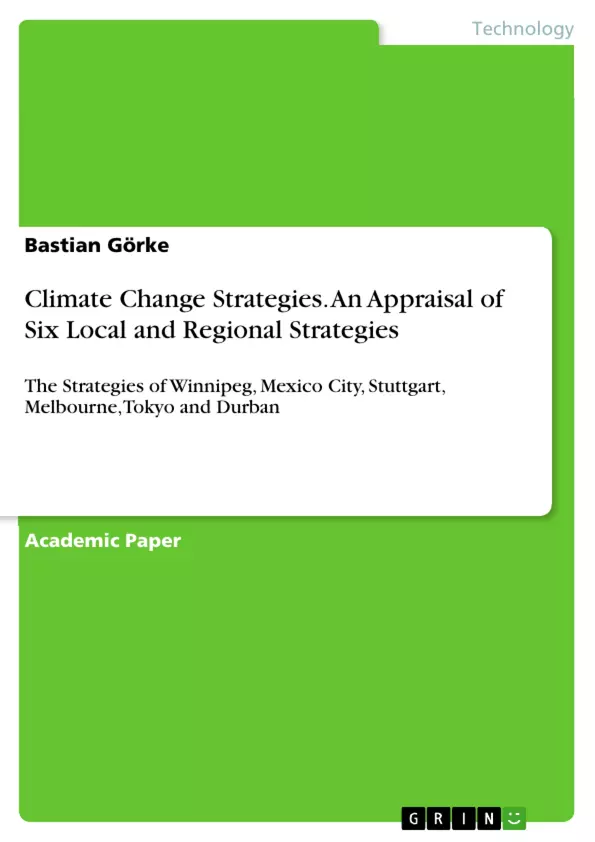This report appraises six local and regional climate change strategies from all over the world.
The global threat of climate change is addressed throughout the world. Local level authorities compose with various motivations documents that directly or indirectly aim at carbon emission reduction. An important emitting factor is transportation. The reduction targets range from vague verbalisations to ambitious numerical commitments.
To achieve these targets measures are in a way similar in all strategies but their potentials have to be specified. The implementation of the measures faces serious barriers and therefore, success of the strategies is in some case questionable.
Inhaltsverzeichnis (Table of Contents)
- Executive Summary
- Introduction
- Appraisal
- Motivation
- Targets
- Integration into other policy areas
- Political leadership
- Suggested Measures
- Implementation
- Monitoring and Re-Adaptation
- Limitation and Barriers
- Conclusion
- References
Zielsetzung und Themenschwerpunkte (Objectives and Key Themes)
This report aims to evaluate six local and regional climate change strategies from around the world, examining their motivations, targets, implementation, and limitations. The analysis focuses on the strategies' approaches to reducing carbon emissions, particularly from transportation.
- The motivation behind local climate change strategies
- The challenges and complexities of implementing climate change mitigation measures
- The effectiveness of different strategic approaches
- The importance of integrating climate change considerations into broader policy areas
- The role of local and regional authorities in addressing global climate change
Zusammenfassung der Kapitel (Chapter Summaries)
The report begins with an overview of the global context of climate change and the role of local and regional authorities in addressing the issue. It then delves into the motivation behind the selected strategies, highlighting the different drivers and priorities in each case.
The report examines the targets set by each strategy, including the specific emission reduction goals and the timeframes for achieving them. It also considers how these targets are integrated into broader policy areas such as transportation, energy, and urban planning.
The report further analyzes the proposed measures for achieving the set targets, discussing their potential effectiveness and the challenges associated with their implementation. It also looks at the monitoring and adaptation strategies in place to track progress and adjust the approach as needed.
The report concludes by highlighting the limitations and barriers faced by each strategy, exploring the factors that can hinder their success. This includes considerations such as financial constraints, political opposition, and public perception.
Schlüsselwörter (Keywords)
This report focuses on local and regional climate change strategies, carbon emissions reduction, transportation, sustainable development, air pollution, implementation challenges, policy integration, and monitoring and adaptation. The report aims to provide an in-depth analysis of these strategies and their effectiveness in addressing the urgent issue of climate change.
Frequently Asked Questions
What is the focus of the local climate change strategies appraised in this report?
The report evaluates six strategies from around the world, focusing on their efforts to reduce carbon emissions, particularly in the transportation sector.
How do reduction targets vary between different regional strategies?
Targets range from vague verbal commitments to highly ambitious numerical commitments for carbon emission reduction.
What are the main barriers to implementing climate change measures?
Key barriers include financial constraints, political opposition, public perception, and the difficulty of integrating climate goals into existing policies like urban planning.
Why is monitoring and re-adaptation important for these strategies?
Monitoring allows authorities to track progress toward emission goals and adjust measures if they are not delivering the expected results.
What role does political leadership play in climate strategy success?
Strong political leadership is crucial for driving the integration of climate considerations into all policy areas and overcoming barriers to implementation.
- Quote paper
- Bastian Görke (Author), 2006, Climate Change Strategies. An Appraisal of Six Local and Regional Strategies, Munich, GRIN Verlag, https://www.hausarbeiten.de/document/1030673


